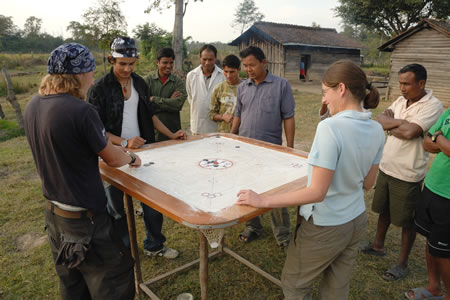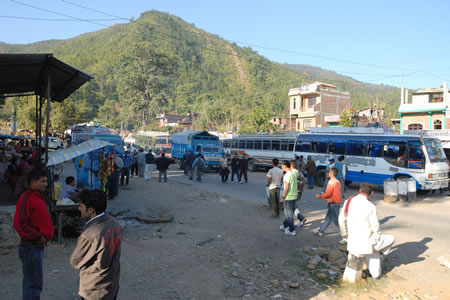English | Dutch |
|
| Stop the bus – Roadblocks in Nepal | |
Butwal (Nepal), December 15th 2007 |
|
Bus rides in Nepal are notorious. For the majority of the Nepalese population is the bus the main mean of motorized transport. Because of the limited capacity, many busses are overcrowded. Busses are normally old and uncomfortable and the safety of bus rides is illustrated by the large number of bus wrecks that you see lying in the valleys below the road. Travel guides and embassies are advising against travelling by bus, because of the safety and the chances of getting stuck in a roadblock. The chances of dying because of a bus accident in Nepal are 30 times higher than in the West. Roadblocks are often used to put pressure on the government. This appears to be effective as it is used for many purposes. Avoiding bus rides is easier said than done. Because there is no efficient and extensive railway system, there is no alternative. Some travellers fly from one place to the other. Certainly this is a safe, comfortable and quick way of travelling. However, this expensive way of getting around also flies you over the beautiful landscapes that you would see if you look through the bus window. The Nepalese music that is played in the busses is also a thing that shouldn’t be missed. Sometimes musicians are playing on traditional instruments to earn a living. The atmosphere in the busses is joyful and it is an excellent place to get in touch with the Nepalese people. |
|
 |
|
Ivonne is playing the popular game of Carom |
|
The first hours of our bus ride from Ambassa to Butwal are very well. The bus driver drives fast, but not to fast. We only stop to let people and goats in and out of the bus and all baggage is tied on top of the roof. Due to the troubles in the recent years there are many police check posts, but fortunately this doesn’t causes a lot of delay. The Western Nepalese landscape is gorgeous and the time flies. After a few hours, it is time for a short lunch break. With a full stomach we drive towards Butwal. If everything stays this way, we will be in Butwal within three hours. Our bus stops in a small village after half an hour. There are several other busses and after a while we notice that there is no traffic passing by or coming towards us. After inquiring about the reason why the bus stopped we come to know that we are stuck in a roadblock. Slowly we learn more about the things that happened a few kilometres from here. This morning, a truck driver ran into a twelve year old kid. The kid died on the spot and the truck driver ran away. One of the reasons why a lot of people try to escape from the scene is that the driver of a vehicle is always guilty in case of an accident with a pedestrian. The one who is guilty has to pay compensation to the relatives. In case of a deadly accident there is a fixed compensation of 21.000 rupee (+/- 230 euro). If the victim is “only” injured, the compensation is equal to all medical costs that have to be made to recover. It is said that some drivers drive over the victim one more time to be sure that the victim is dead, because these medical costs are often higher than the fixed compensation. Normally, drivers are not insured. Although the fixed compensation seems very low, this financial burden cannot be carried by many Nepalese. So, it is not strange that people try to escape from that financial burden. There is a lack of trust in the police and legal system which causes that surviving relatives do not want to wait patiently until the cops have caught the guilty person. To be sure that the compensation is paid quickly, they want to put pressure on the police by installing a roadblock. People from the village are pulling trunks on the road and burn tires. Whenever there is someone trying to break through the roadblock, stones are thrown to the impatient passer-by. Because there are not many roads, there are no alternative routes so it is almost impossible to make a detour to escape from the roadblock. Hence, a roadblock is a very effective way to disrupt the daily life in Nepal. The case of “our” roadblock is even more complicated because there was a similar accident in the same village a few weeks ago. That driver wasn’t insured and after hours of blocking the road, the police guaranteed that the compensation would be paid. However, the widow hasn’t received a single rupee yet. So, with this roadblock they want to solve both cases at once. The demands of the villagers are clear. They want the truck drivers of both accidents to come to the place of the accident where they must sign documents to make sure that the compensation is paid. They also demand that the local authorities are present, so there has to be done a lot before our bus drive can to Butwal. | |
 |
|
People and busses are waiting because of a roadblock |
|
| While we sympathize with the surviving relatives of both accidents, after four hours we begin to wander how long such a roadblock normally takes. The answer to that question doesn’t make us happy. While some roadblocks are terminated after a few hours, others take several days. When we notice that some locals are making hotel reservations in the few local hotels of this town we decide to do the same. We pay a non-refundable amount of 2 euros to rent a room for the night and to make sure that we don’t have to sleep in the bus the coming nights. Hotels, shops and footstalls are doing good business when there is a roadblock. Waiting makes people hungry and thirsty. Because many Nepalese like an alcoholic drink, a lot of whiskey bottles are emptied during the waiting. Everybody tries to make the best out of the situation and it is quite enjoyable to hang around in the village.
When the sun sets behind the horizon, it gets quit chilly in this time of the year. People are warming themselves by sitting around small fires and drinking tea and whiskey. Some people are looking for a place to sleep in the bus, others move to their hotel room while others are staying in the local pub. Our bus driver gets all the baggage from the roof to minimize the changes that something gets stolen. Like most Nepalese that we have met so far, people are thoughtful and helpful. Around 21:00 hours we start to consider to go and sleep in our hotel room. The street is getting empty and the pub where we spend the last hours is starting to close the sliding doors. On the streets we hear the latest news about the roadblock. The people who installed the roadblock are also getting cold, are also tired and are also hungry. Presumably, they open the road for a few hours in the coming night to start the roadblock next morning again. To be sure that we don’t miss the temporary opening of the road we decide to hang around. At 21:45 hour, the moment is there. A few loud honking cars are driving towards us on the road. This is the sign that the road is open again and from all directions people are running back to their vehicles to continue their journey. When we pass by the location of the roadblock, we see approximately fifty people standing around burning tires. An ambulance has picked up the body of the boy only an hour ago. Until that time, he was the silent witness of the things that happened after he died. It gives a strange feeling to know that these kinds of roadblocks often occur. The surviving relatives start their mourning after the financial compensation is secured. Corruption and a slow and inefficient legal system causes that people want cash on the nail. They feel that they have to fight for their rights as there is no one else who will do that for them. | |